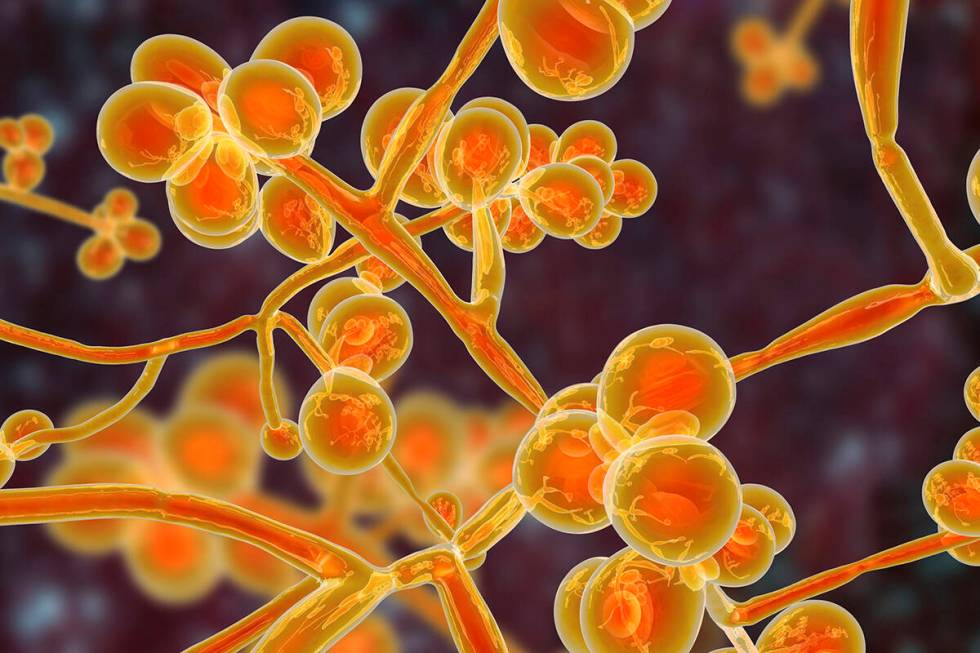CDC officials assist investigation into Southern Nevada ‘superbug’ cases

For a second consecutive week, U.S. Centers for Disease Control and Prevention officials are in Southern Nevada to investigate cases of a drug-resistant “superbug” at local hospitals and skilled-nursing facilities.
The CDC is assisting the state in investigating 12 of 19 local facilities that have reported cases of Candida auris, a once-rare fungus that can cause serious illness and even death, most often in patients who already are frail.
Teams of federal and state health officials had visited five facilities as of Wednesday morning, said Kimisha Causey with the Nevada State Healthcare Associated Infection Program. She did not identify any facilities that are experiencing ongoing outbreaks, saying it was too soon to make that determination.
A facility won’t be identified as having an outbreak until “it’s definitely clear that we can pinpoint that there is ongoing transmission within a specific facility,” Causey said in an interview Wednesday.
Making this determination is complicated by the fact that patients can be “colonized” with the fungus – and able to spread it to others – without having any signs of infection. When such a case is identified, it can be unclear whether the patient acquired the fungus before being admitted, especially if they were transferred from another facility.
Facilities are ramping up screening for colonization based on CDC guidance to check those at higher risk, such as patients who were transferred from a long-term acute care or skilled nursing facility, or who have recently traveled internationally, Causey said.
Patients in units where a case or cases have been identified also may be screened, which involves a swab test to the armpit or groin area, Causey said, places where the fungus can thrive.
C. auris, which spreads easily through contact with contaminated surfaces, can cause bloodstream infections and even death, particularly in hospital and nursing home patients with serious medical problems. More than 1 in 3 patients die who have an invasive C. auris infection, such as one affecting the blood, heart or brain, according to the CDC.
Investigators have found “some gaps in infection prevention,” including an instance where precautions with an infected patient were not immediately taken, Causey said.
Causey said investigators have not found anything that she would describe as alarming. They have not recommended that any unit of a hospital or a facility temporarily shut down, she said.
State and federal officials are visiting facilities to evaluate infection-prevention controls and other practices including hand-washing and the wearing of personal protective equipment, Causey said. Officials also are making observations and collecting data on cases.
They are looking for patterns, such as whether patients with cases at a particular facility were transferred there from a common facility.
Once the CDC team returns to Atlanta, “they’ll kind of go through all of the data and give us a report back,” Causey said.
Causey said she could not estimate how long the investigation would take.
From Jan. 3 to May 16, 73 clinical cases of C. auris were identified in Southern Nevada and 92 cases were found in which the individuals were colonized, according to the Nevada Department of Health and Human Services, which did not provide an updated figure Wednesday.
In the U.S., C. auris infection has primarily been identified in people with serious underlying medical conditions who have received multiple antibiotics, and who have had prolonged admissions to health care settings or reside in health care settings, the CDC states.
Some authorities believe that cases are on the rise in part due to precautions to prevent spread not being strictly followed when hospitals were overwhelmed by COVID-19 cases. Causey said a surge in COVID-19 cases was given as a reason why certain precautions were not immediately taken in connection with a C. auris patient.
Contact Mary Hynes at mhynes@reviewjournal.com or 702-383-0336. Follow @MaryHynes1 on Twitter.